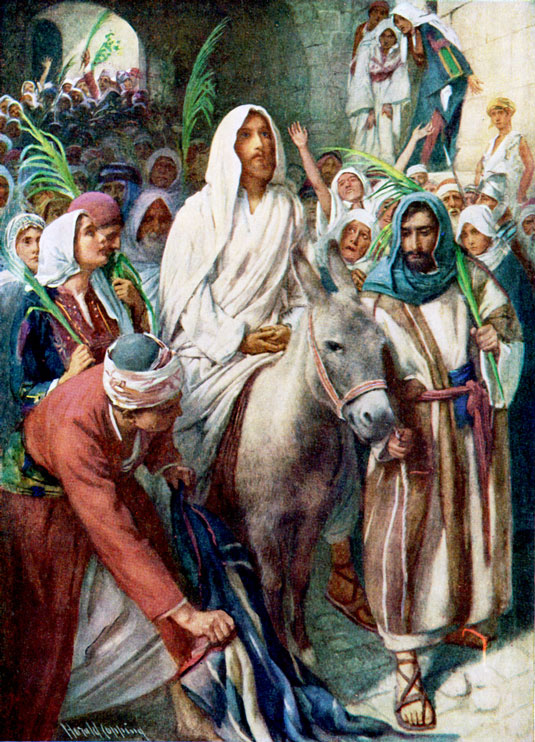 It was a spring morning in Jerusalem—a day that we would later refer to as Palm Sunday. We can imagine that the sun was shining, the birds were singing, and the air was filled with shouts of praise. “Hosanna!” they cried, “Hosanna in the highest! Blessed is the king of Israel!” This was a day that many Jews had been waiting for. The Messiah, promised by God through the Prophets, was making his way into the city of Jerusalem. In fulfillment of Scripture, Jesus entered the city on the back of a donkey.
It was a spring morning in Jerusalem—a day that we would later refer to as Palm Sunday. We can imagine that the sun was shining, the birds were singing, and the air was filled with shouts of praise. “Hosanna!” they cried, “Hosanna in the highest! Blessed is the king of Israel!” This was a day that many Jews had been waiting for. The Messiah, promised by God through the Prophets, was making his way into the city of Jerusalem. In fulfillment of Scripture, Jesus entered the city on the back of a donkey.
Rejoice greatly, Daughter Zion! Shout, Daughter Jerusalem! See, your king comes to you, righteous and victorious, lowly and riding on a donkey, on a colt, the foal of a donkey. (Zechariah 9:9, NIV)
Jubilation and excitement reign in the hearts of the people as they throw their cloaks down in front of him in recognition of his kingship. Those along the roadway welcome Jesus with outstretched hands and swaying palm branches. Hope among the people is palpable. Shouts of Hosanna (which can be translated save now) reveal the crowd’s expectations. Would this man bring them peace? Would he end the Roman occupation that had made their lives unbearable? Would he restore Israel as a nation?
Prior to this day, Jesus had dissuaded his followers from invoking the words of Psalm 118, but on this day, he not only allowed the crowd’s acknowledgment, but encouraged it. When this annoyed the religious leaders, he affirmed that if the people remained silent, the very stones on the road would cry out in praise.
“Blessed is the king who comes in the name of the Lord!” “Peace in heaven and glory in the highest!”
Some of the Pharisees in the crowd said to Jesus, “Teacher, rebuke your disciples!”
“I tell you,” he replied, “if they keep quiet, the stones will cry out.” (Luke 19:38-40, NIV)
All of this must have made the disciples feel pretty confident—basking in the crowd’s adulation of their leader. Everything was going so well. The disciples were well situated, the religious leaders were apoplectic, and the public was enthusiastically receptive.
But oh, how the hearts of mankind are fickle. Just a few short days later, those same voices would be raised in anger. The previous cries of “Hosanna!” would be replaced with chants of “Crucify him!” Talk about a change of sentiment. What could have caused the people to abandon their hope so dramatically? Some pastors explain the shift on a cynicism that occurred among the people once Jesus was arrested. Maybe they thought, “This guy’s not the Messiah—he can’t even get himself out of custody.” They wanted to accept Jesus as Messiah—but on their own terms, not on his. They expected him to deliver them from Roman rule and when that didn’t happen, the crowd turned on him. Could this have been a case of “group-think” where a mob allows a raucous few to tell them what they believe? Did the people ever really believe that Christ was who he said he was?
Before the events of Palm Sunday, Jesus covered this topic in a conversation he had with his disciples.
Jesus and his disciples went on to the villages around Caesarea Philippi. On the way he asked them, “Who do people say I am?”
They replied, “Some say John the Baptist; others say Elijah; and still others, one of the prophets.”
“But what about you?” he asked. “Who do you say I am?”
Peter answered, “You are the Messiah.” (Mark 8:27-29, NIV)
I love the directness of this passage. Jesus understands how “group-think” can influence us, so he narrows the question to bring up the obvious. It doesn’t matter what the group says—what do you say? He emphasized the importance of the individual decision each one of us makes about who he is.
There is a famous quote from CS Lewis, which describes the choice each person must make regarding the personhood of Christ.
I am trying here to prevent anyone saying the really foolish thing that people often say about Him: “I’m ready to accept Jesus as a great moral teacher, but I don’t accept His claim to be God.” That is the one thing we must not say. A man who was merely a man and said the sort of things Jesus said would not be a great moral teacher. He would either be a lunatic—on a level with the man who says he is a poached egg—or else he would be the Devil of Hell. You must make your choice. Either this man was, and is, the Son of God: or else a madman or something worse. You can shut Him up for a fool, you can spit at Him and kill Him as a demon; or you can fall at His feet and call Him Lord and God. But let us not come with any patronizing nonsense about His being a great human teacher. He has not left that open to us. He did not intend to. (Lewis, C.S. (Clive Staples), Mere Christianity, revised edition, New York, Macmillan/Collier, 1943, p. 40)
That sure rings true of many sentiments we hear today. Countless people are willing to accept Jesus of the New Testament as the great non-judgmental pacifist who preached love and tolerance. But fewer are willing to accept the God of the Old Testament who they describe as angry, vengeful and intolerant. I wonder how those views might change if they really considered how Jesus described himself. In a conversation with the Pharisees, he tells us.
Are you greater than our father Abraham? He died, and so did the prophets. Who do you think you are?”
Jesus replied, “If I glorify myself, my glory means nothing. My Father, whom you claim as your God, is the one who glorifies me. Though you do not know him, I know him. If I said I did not, I would be a liar like you, but I do know him and obey his word. Your father Abraham rejoiced at the thought of seeing my day; he saw it and was glad.”
“You are not yet fifty years old,” they said to him, “and you have seen Abraham!”
“Very truly I tell you,” Jesus answered, “before Abraham was born, I am!” (John 8:53-58, NIV)
Jesus claims to be the great I Am of the Old Testament as well as The Christ of the New Testament. He claims to be the promised Messiah, the Son of God and the Lamb who takes away the sins of the world. He claims to be the Almighty God, the Everlasting Father, the Prince of Peace, Comforter, Healer, Redeemer, Bread of Life and the Way, the Truth and Spring of Living Water.
Now, if he’s really just a poor demented soul, or just a persuasive con-man, then his claims are interesting, but don’t really matter too much.
But, if Jesus really is the Son of God whose sacrifice was a necessary component to restore us to life, then his claims matter a great deal. More importantly, how we respond to his claims has eternal ramifications for us. So, is Jesus a liar? Is he a lunatic? Or is he the Lord?
On the journey toward Home,











